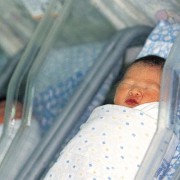 Photo: Getty Images
Photo: Getty Images
The time of day that you deliver your baby may increase your newborn's risk of having brain problems. Children who are delivered at night have a slightly higher risk of being born with a condition called neonatal encephalopathy. Three clinical stages of neonatal encephalopathy exists. In stage one of the condition, the duration is less than 24 hours. The infant has uninhibited stretch reflexes and an uninhibited Moro reflex or startle reflex, which is a primitive reflex. At stage one, the electroencephalogram is normal. With stage two neonatal encephalopathy, the infant can have decreased spontaneous movements, which can occur with seizures or without them. The infant can also have a reduced mental capacity and low muscle tone. The Auckland District Health Board's Newborn Services Clinical Guideline noted that with stage three neonatal encephalopathy, the infant has seizures, stupor, flaccidity, and suppressed functions in the autonomic nervous system and the brain stem.
Reuters Health reported that greater than 50 percent of infants who have neonatal encephalopathy die or develop neurological conditions, which include epilepsy and cerebral palsy. With epilepsy, patients have irregular electrical signals in the brain, which causes seizures. Patients may lose consciousness during a seizure, depending on the type of seizure that they have. Cerebral palsy symptoms range from mild to severe. Five types of cerebral palsy exist: dyskinetic, ataxic, spastic, hypotonic and mixed, with spastic cerebral palsy being the most common, according to MedlinePlus. Patients with spastic cerebral palsy can have tight muscles, paralysis, joint contracture and an abnormal walk.
So how does the development of neonatal encephalopathy relate to the time of delivery? In a study published in the American Journal of Obstetrics and Gynecology, the researchers looked at the time of birth in almost two million term infants in California. Reuters Health reported that the researchers found that more than 2,000 infants had brain problems, and 16 percent of the infants passed away before one month of age. The researchers found that babies who were born between 10 p.m. and 4 a.m. had a 22 percent greater risk of neonatal encephalopathy compared to babies who were born during daytime. While there is a greater risk of neonatal encephalopathy in infants who are born at night, it does not mean that a nighttime birth causes neonatal encephalopathy. In addition, the majority of babies who are born at night do not have the condition, according to Reuters Health.





Add a Comment1 Comments
Can I "dislike" this very poorly written article?
January 5, 2011 - 6:02pmThis Comment